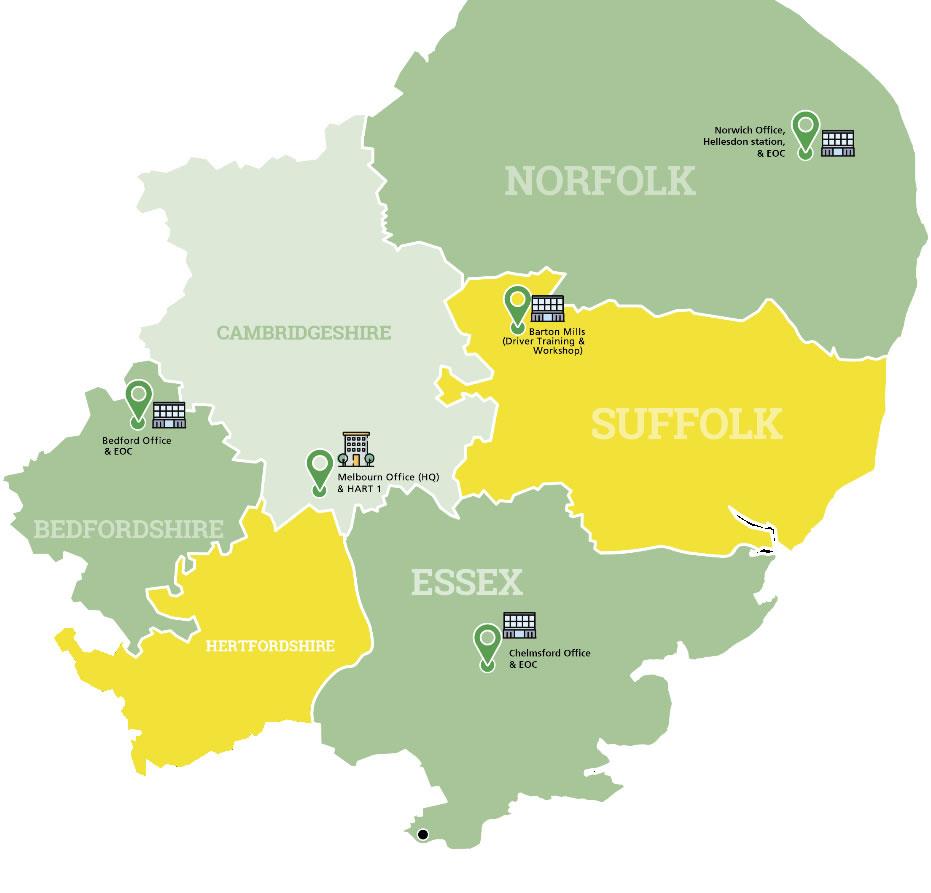Introducing the EEAST Quality Account 2022-23
Our Trust provides emergency and urgent care services throughout Bedfordshire, Cambridgeshire, Essex, Hertfordshire, Norfolk and Suffolk.
During 2022/23 we also provided non-emergency patient transport services for patients needing non-emergency transport to and from hospital, treatment centres and other similar facilities within Cambridgeshire, parts of Essex, Bedfordshire and Hertfordshire.
We work with six Integrated Care Systems (ICS) covering an area of approximately 7,500 square miles with a resident population of around 6.3 million people.
We employ more than 5,000 staff operating from over 120 sites and are supported by more than 1,200 dedicated volunteers working in a variety of roles including: Community First Responders; volunteer car drivers; BASICS doctors; chaplains and our community engagement group.
The Trust Headquarters is in Melbourn, Cambridgeshire and there are ambulance emergency operations centres (EOC) at each of the three locality offices in Bedford, Chelmsford and Norwich which receive over 1 million emergency calls from across the region each year as well as calls for patients booking non-emergency transport.

The east of England is made up of both urban and rural areas with a diverse population. As well as a resident population of about 6.3 million people, several thousand more tourists enjoy visiting our area in peak seasons each year. Our area also contains several airports including London-Luton and London-Stansted as well as major transport routes which increase the number of people in our region on a daily basis.
We have four areas of service provision:
Response to 999 calls as an emergency and urgent care service
In 2022/23, our emergency operations centre (EOC) received 1,397,119 emergency contacts from the public.
On average, over 2,850 emergency 999 calls came into the ambulance service every day.
Call handlers record information about the nature of the patient’s illness or injury using sophisticated software to make sure they get the right kind of medical help. This is known as triaging, and allows us to ensure that the most seriously ill patients can be prioritised and get the fastest and most appropriate response.
Once this key information is established, the response will be selected from a range of care providers including a single clinician in a fast response car, a double staffed emergency ambulance dispatched on blue lights, or a clinical assessment conducted over the phone by an appropriate clinician for patients with conditions that do not require a face-to-face response.
This response would include advice over the phone from a paramedic/nurse/social worker or a referral to their GP, pharmacist or walk-in centre.
Special and partnership operations
The Trust operates two hazardous area response teams (HART) and has a resilience and emergency planning department who work closely with critical care charities and community volunteers to respond to a variety of emergency situations.
Scheduled Care Service – Patient Transport Service
We operate a quality Non-Emergency Patient Transport Service (NEPTS), working in collaboration with hospitals and treatment centres, transporting and caring for a variety of patients, including elderly and vulnerable people, and those with mental ill health, to and from outpatient clinics, day-care centres, and other treatment facilities.
Staff are trained to lift and manoeuvre patients in and out of vehicles, ensuring patients are safe and comfortable during the journey and arrive on time for appointments. Staff are also trained to administer first aid or life saving techniques should this be necessary. Other duties include making sure vehicles are clean and tidy, in line with strict infection and prevention guidelines and keeping accurate records of journeys. During 2022/23 we undertook 456,526 patient journeys and 44,360 escort journeys – a total of 500,886 NEPTS journeys.s.
Commercial services
We operate a number of commercial services that generate income for the trust, as well as providing organisational resilience.
CallEEAST, our non-emergency and commercial contact centre, offers an array of contact centre solutions to commercial organisations and NHS Trusts. The team supports 80 separate contracts handling in excess of 850,000 calls every year.
The National Performance Advisory Group (NPAG) brings people together nationally to share best practice and showcase industry developments across the NHS enabling innovation and efficiency.
TrainEEAST, the Trust’s commercial training department offers a wide range of first aid and emergency care training courses for businesses, organisations, individuals and our own people.
Next Page: What is a Quality Account and what does it mean to EEAST and the people we serve?
